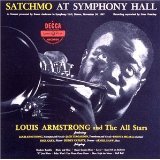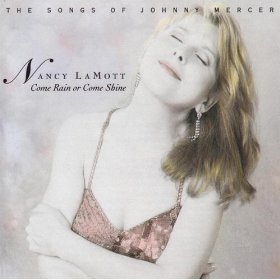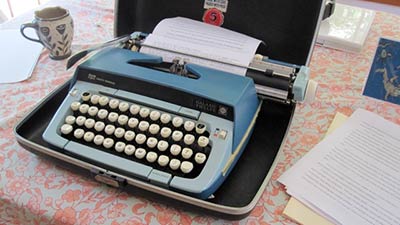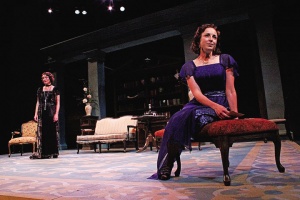Mrs. T and I encountered some difficulties when we took a vacation earlier this summer, most of which, I freely confess, were of my making. Having had only modest experience with full-fledged vacations, I crammed too many activities and too much travel into not enough time, making us completely exhausted by the time we returned home. We then launched into the usual frenzied coast-to-coast round of visits to summer theater festivals, which ran us both down still further. At some point along the way, it occurred to me that what we needed was a second vacation–one during which we would do nothing whatsoever. To this end, I hacked eight precious days out of my schedule, and last Monday we packed our bags, hopped in the car, and headed west.
 Never let it be said that nobody learns from experience. This time around I arranged things so that I had no shows to see, no deadlines to hit, and no “improving books” (thank you, Jeeves) to read in my spare time. The only books that I brought with me on the trip were a half-dozen mysteries by Rex Stout and Georges Simenon. I packed my laptop and checked my e-mail more or less regularly, but I kept my communication with the outside world down to a fairly bare minimum, and I didn’t write a single word for publication, or for this blog, while Mrs. T and I were on the move.
Never let it be said that nobody learns from experience. This time around I arranged things so that I had no shows to see, no deadlines to hit, and no “improving books” (thank you, Jeeves) to read in my spare time. The only books that I brought with me on the trip were a half-dozen mysteries by Rex Stout and Georges Simenon. I packed my laptop and checked my e-mail more or less regularly, but I kept my communication with the outside world down to a fairly bare minimum, and I didn’t write a single word for publication, or for this blog, while Mrs. T and I were on the move.
Longtime readers won’t be surprised to hear that we divided our time between Bridgeton House in Upper Black Eddy, Pennsylvania, and Ecce Bed and Breakfast in Barryville, New York, two lovely, immaculately run inns situated near different stretches of the Delaware River. I’ve raved about both places before–Mrs. T and I actually honeymooned at Ecce–and I knew that our hosts would treat us like crowned royalty. We slept well, ate well, and spent long spans of time listening to the Delaware River flow. Otherwise we emulated the sound advice that Jack Nicholson failed to take in Chinatown: we did as little as possible.
 The effects of all this masterly inactivity can be summed up in ten happy words: I can’t remember the last time I felt so rested. I knew I was tired, but I didn’t fully understand how tightly wrapped I was until the knots came undone and I started to relax. By the time we returned to Connecticut late yesterday afternoon, I’d shed my cares and felt like myself again–or, rather, like the self I ought to be. It helped that I took further care to arrange things so that I won’t be going back to work again until Saturday, when I’ll return to New York to see a preview of Edward Albee’s new play. Until then I mean to ease back into the world an inch or two at a time.
The effects of all this masterly inactivity can be summed up in ten happy words: I can’t remember the last time I felt so rested. I knew I was tired, but I didn’t fully understand how tightly wrapped I was until the knots came undone and I started to relax. By the time we returned to Connecticut late yesterday afternoon, I’d shed my cares and felt like myself again–or, rather, like the self I ought to be. It helped that I took further care to arrange things so that I won’t be going back to work again until Saturday, when I’ll return to New York to see a preview of Edward Albee’s new play. Until then I mean to ease back into the world an inch or two at a time.
And then? The trick will be to figure out to unwind in the interstices of my working life. I don’t expect to be very good at it. I have half a lifetime of bad habits to unlearn, and some “lessons” have to be learned over and over again. But at least I’ve found out how it feels to be completely unwound, thanks to Mrs. T and our kindly hosts at Bridgeton House and Ecce. May their efforts not be in vain!
Archives for 2010
TT: Almanac
“We mustn’t forget how quickly the visions of genius become the canned goods of the intellectuals.”
Saul Bellow, Herzog
TT: Fifteen albums in fifteen minutes
A number of friends have invited me to play the following game that’s been making the rounds in cyberspace:
The rules: Don’t take too long to think about it–choose fifteen albums you’ve heard that will always stick with you. List the first fifteen you can recall in no more than fifteen minutes. (These aren’t favorite albums, necessarily, just the fifteen that will always stick with you.)
I drew my list up with as little forethought as possible. When I was finished, I realized that in all but a couple of instances, these were the albums that introduced me to the music of the artists who made them.
I subsequently got to know some of those artists personally. It was on Maria Bachmann’s Fratres, for example, that I first heard the music of Paul Moravec, with whom I was to collaborate on The Letter sixteen years later.
Here goes:
 • Louis Armstrong, Satchmo at Symphony Hall
• Louis Armstrong, Satchmo at Symphony Hall
• Maria Bachmann and Jon Klibonoff, Fratres
• The Band, The Band
• Rosanne Cash, Black Cadillac
• Duke Ellington, Never No Lament: The Blanton-Webster Band
• Bill Evans, Conversations With Myself
• Vladimir Horowitz, The Historic Return
 • Nancy LaMott, Come Rain or Come Shine: The Songs of Johnny Mercer
• Nancy LaMott, Come Rain or Come Shine: The Songs of Johnny Mercer
• Mabel Mercer, The Art of Mabel Mercer
• Pat Metheny, Bright Size Life
• Stephen Sondheim, A Little Night Music
• Luciana Souza, Brazilian Duos
• Steely Dan, Aja
• Joseph Szigeti and Béla Bartók, A Sonata Recital by Joseph Szigeti and Béla Bartók
• The Who, Live at Leeds
TT: Just because
Dave McKenna plays “A Beautiful Friendship” at the Northsea Jazz Festival in 1980:
TT: Almanac
“Murder is unique in that it abolishes the party it injures, so that society has to take the place of the victim and on his behalf demand atonement or grant forgiveness; it is the one crime in which society has a direct interest.”
W.H. Auden, “The Guilty Vicarage”
PLEASE OMIT MUSIC (OR ELSE)
“What is it about music that gets true believers so hot and bothered? The British novelist Anthony Powell put his finger on it when he spoke in A Buyer’s Market of the ‘sensual essence’ of the fine arts. This is especially true of music, which is both incorporeal–you can’t see or touch it–and fundamentally sensual in its appeal…”
CAAF: The Galaxie 12

A few months ago I told my friend R. that I’d thrown out the novel I’d been working on for the past few years after realizing that it was hopelessly botched and started something new. A few days later he left this typewriter, a manual Smith-Corona, on my porch as a loan. Truth to tell, while I appreciated the gesture, the typewriter remained in its case until the other week when I got it out for some note-taking. I liked it, invested in a fresh ribbon, and now it’s my new “orgasm pen.”
The two main things I like about the typewriter: You have to move forward — no endless revision with the delete key — and it’s not connected to the Internet. Also, the dog thumps her tail every time the carriage returns even when she’s mid-nap.
Related: Maud recently uncovered this trove of BBC author interviews . There are lots of amazing ones, but my favorite so far is Daphne Du Maurier’s as it opens on her at her typewriter, which would be the standard “the author at work” establishing shot except for DuMaurier’s super-strong finger-punching technique on the keys.
TT: Not so good for the geese
In the second of two reports from Wisconsin’s American Players Theatre, I review a major revival of Somerset Maugham’s rarely seen The Circle in this morning’s Wall Street Journal. Here’s an excerpt.
* * *
 Long before he became one of the world’s most popular novelists, Somerset Maugham was one of England’s most successful playwrights. Four of his new plays actually ran simultaneously in London’s West End in 1908, an achievement that makes Neil Simon look like a piker. But Maugham’s brand of high social comedy had fallen from grace long before his death in 1965. It’s been 21 years since any of his plays was successfully mounted on Broadway, and that one, “The Circle,” presumably owed its success to the presence in the cast of Rex Harrison. While Maugham revivals are not unknown in this country, one almost always has to get out of New York to see them. So I hastened to Wisconsin’s American Players Theatre, one of America’s top classical companies, to find out how well “The Circle,” which was first performed in London in 1921, has held up, and the answer–to my surprise–is that it is not merely viable but brilliant.
Long before he became one of the world’s most popular novelists, Somerset Maugham was one of England’s most successful playwrights. Four of his new plays actually ran simultaneously in London’s West End in 1908, an achievement that makes Neil Simon look like a piker. But Maugham’s brand of high social comedy had fallen from grace long before his death in 1965. It’s been 21 years since any of his plays was successfully mounted on Broadway, and that one, “The Circle,” presumably owed its success to the presence in the cast of Rex Harrison. While Maugham revivals are not unknown in this country, one almost always has to get out of New York to see them. So I hastened to Wisconsin’s American Players Theatre, one of America’s top classical companies, to find out how well “The Circle,” which was first performed in London in 1921, has held up, and the answer–to my surprise–is that it is not merely viable but brilliant.
Most of Maugham’s other plays, to be sure, are period pieces that merit the dusty obscurity into which they long ago fell, but “The Circle” is different. Instead of the not-quite-Wilde-enough epigrams of “The Constant Wife,” we get a drawing room full of well-dressed but plain-spoken characters who might have stepped out of one of Maugham’s own short stories, plus a plot so soundly made that you’ll be engrossed as soon as the wheels start turning.
Lady Kitty (Tracy Michelle Arnold), the fallen woman at the center of “The Circle,” walked out on Clive (Brian Mani), her husband, 30 years ago and ran off to Italy with Lord Porteous (James Ridge), Clive’s best friend. Now Kitty and her aging consort have returned to England for the first time to pay a call on Arnold (Paul Hurley), her son, who was five years old when she bolted and is now a promising but priggish young politician who recoils at the thought of further scandal. Little does Arnold know that Elizabeth (Susan Shunk), his wife, has fallen for another man and is thinking of doing as Lady Kitty did…
James Bohnen, the departing artistic director of Chicago’s Remy Bumppo Theatre Company, a troupe whose work I greatly admire, has caught the tone of “The Circle” with perfect exactitude, and his cast, which consists for the most part of old APT hands, is with him all the way. Ms. Shunk, who is so fine as Birdie in this season’ revival of Lillian Hellman’s “Another Part of the Forest,” is, if anything, even more appealing as Elizabeth. At first her naïvete seems a bit much–you want to kick some sense into her–but before long you’ll find yourself hoping against hope that she’ll refuse to settle for the respectable life of a politician’s wife….
* * *
Read the whole thing here.
